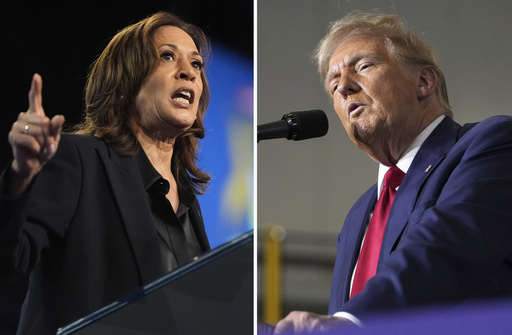A recent analysis by the nonpartisan Committee for a Responsible Federal Budget unveils projections of higher deficits under potential economic plans from Vice President Kamala Harris and Former President Donald Trump. The report indicates that Harris’ proposed investments in the middle class and housing could potentially increase the national debt by $3.5 trillion over 10 years, despite assertions from her campaign that these investments would be financed through higher taxes on corporations and the wealthy.
In comparison, the analysis suggests that Trump’s economic strategies could add an additional $7.5 trillion to $15.2 trillion to the debt, fueled by his belief in strong economic growth that would offset concerns about deficits.
The findings presented in the 34-page report shine a light on the pressing issue of government borrowing that the next president will need to address. With the current federal debt exceeding $28 trillion and anticipated to rise further due to insufficient revenue to cover escalating costs of programs like Social Security and Medicare, the report underscores the critical need for fiscal responsibility.
Despite both candidates not prioritizing budget deficit reduction in their campaigns, various analyses highlight a notable difference in their approaches to fiscal responsibility. Leading economists like Jason Furman from Harvard University suggest that Harris’ plans could either decrease deficits by $1.5 trillion or increase them by the same amount. In contrast, Trump’s proposed policies might escalate deficits by $5 trillion, according to Furman’s estimates, which do not include certain tax-related provisions.
Additional research from The Budget Lab at Yale and the Penn Wharton Budget Model reinforces the notion that Harris could be more effective in managing the deficit compared to Trump. The Committee for a Responsible Federal Budget’s analysis underscores potential scenarios where Harris’ policy proposals could contribute to an additional $3.5 trillion in national debt through 2035.
While Harris’ plans include tax reductions and investments, the report suggests that the revenue from higher taxes on corporations and the wealthy may not suffice to cover the full cost of her proposed agenda and the resulting interest on the debt. On the other hand, various interpretations of Harris’ statements present a spectrum of possibilities, from her policies having no impact on baseline deficits to potentially adding up to $8.1 trillion in debt.
Trump’s economic blueprint, on the other hand, could potentially result in an extra $7.5 trillion increase in the debt according to the analysis. The report outlines different scenarios, including one where the national debt could skyrocket by $15.2 trillion if certain variables like tariff revenues and deportation costs deviate from initial projections.
Overall, the analysis underscores the importance of careful fiscal planning and responsible economic policies to address the growing national debt, emphasizing the contrasting approaches proposed by Harris and Trump in dealing with this critical issue.


